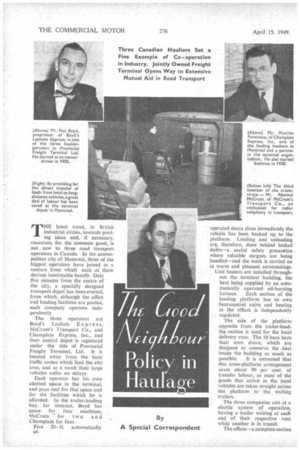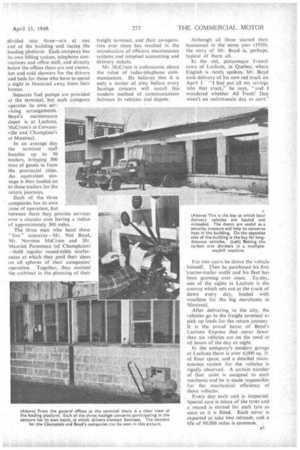By A Special Correspondent T HE latest trend, in British industrial
Page 14

Page 15

If you've noticed an error in this article please click here to report it so we can fix it.
circles, towards pooling ideas and, if necessary, resources, for the common good, is not new to three road transport operators in Canada. In the cosmopolitan city of Montreal, three of the biggest operators have joined in a venture from which each of them derives inestimable benefit. Only five minutes from the centre of the city, a specially designed transport depot has been erected, from which, although the office and loading facilities are pooled, each company operates independently
The three operators are Boyd's Lachute Expres s, McCrum's Transport Co., and Champlain Express, Inc., and their central depot is registered under the title of Provincial Freight Terminal, Ltd. It is located away from the busy traffic routes which feed the city area, and as a result their large vehicles suffer no delays Each operator has his own allotted space in the terminal, and pays rent for that space and for the facilities which he is afforded. In the trailer-loading bay, for instance, Boyd has space for four machines, McCrum for two and Champlain for four.
Five 20 ft. automatically u6 operated doors close immediately the vehicle has been backed up to the platform. Loading and unloading are, therefore, done behind locked dobrs—a useful safety precaution where valuable cargoes are being handled—and the work is carried on in warm and pleasant surroundings.
Unit heaters are installed throughout the terminal building, the heat being supplied by an automatically operated oil-burning furnace. Each section of the loading platform has its own heat-control valve and heating in the offices is independently regulated.
The side of the platform opposite from the trailer-loading section is used for the local delivery vans. The 10 bays have their own doors, which are designed to conserve the -heat inside the building as much as possible. It is estimated that this cross-platform arrangement saves about 90 per cent. of transfer labour, as most of the goods that arrive in the local vehicles are taken straight across the platform to the waiting trailers.
The three companies aim at a shuttle system of operation, having a trailer waiting at each end of their respective runs while another is in transit.
The offices—a complete section
,divided into three—are at one end of the building and facing the 'loading platform Each company has its own billing system, telephone connections and office staff, and directly below the offices there are rest rooms, hot and cold showers for the drivers and beds for those who have to spend a night in Montreal away from their homes.
Separate fuel pumps are provided at the terminal, but each company operates its own servicing arrangements.
Boyd's maintenance•depot is at •Lachute,
McCrum's at Cowansvile and Champlain's at Montreal.
In art average day the terminal staff handles up to 50 trailers, bringing 500 tons of goods in from the provincial cities. An equivalent tonnage is then loaded on to these trailers for the return journeys.
Each of the three companies has its own zone of operation, but between them they provide services over a circular area having a radius of approximately 300 miles. The three men who• head these "live" concerns—Mr. Nat Boyd, Mr. Norman IsitcCrum and Mr. Maurice Parenteau (of Champlains) --hold regular round-table conferences at which they pool their ideas on all spheres of their companies' operation. Together, they assisted the architect in the planning of their freight terminal, and their co-operation ever since has resulted in the introduction of efficient maintenance systems and simplied accounting and delivery tickets.
Mr. McCrurn is enthusiastic about . the value of radio-telephone communication. He believes that it is only a matter of time before every haulage concern will install this modern method of communication between its vehicles and depots. Although all three started their businesses in the same year ()930), the story of Mr. Boyd is, perhaps, typical of them all.
In the old, picturesque French town of Lachute, in Quebec, where English is rarely spoken, Mr. Boyd took delivery of his new red truck on April 1. " I had put all my savings into that truck;", he . says, "and I wondered whether All Fools' Day wasn't an unfortunate day to start."
For two years.he drove the vehicle himself. Then he purchased his first -tractor-trailer outfit and his fleet has been growing ever since. To-day, one of the sights in Lachute is the convoy which sets out at the crack of dawn every day, loaded with woollens for the big merchants in Montreal.
After delivering in the city, the vehicles go to the freight terminal to • pick up loads for the return journey. It is the proud boast of Boyd's Lachute Express that never fewer than six vehicles are on the road at all hours of the day or night.
In the company's modern garage at Lachute there is over 6,000 sq. ft. of floor space, and a detailed maintenance system for the vehicles is rigidly observed. A certain number of fleet units is assigned to each mechanic and he is made responsible for the mechanical efficiency of those vehicles.
Every day each unit is inspected. Special care is taken of the tyres and a record is started for each tyre as soon as it is fitted. Each cover is expected to take two retreads, and a life of 90,000 miles is common.


























